Testament bassist’s advice for confident bass playing, regardless of one’s age
Exclusive interview with FBPO’s Jon Liebman
August 9, 2021
Most metal fans need no introduction to Steve Di Giorgio. A giant of the genre, he’s celebrated for bringing the fretless bass to the metal scene and helping usher in a new, heavier, thrashier era in the 1980s. Di Giorgio is well known for his role with Testament, with whom he is again currently playing bass, as well as his association with acts like Death, Sebastian Bach, Sadus, and Charred Walls of the Damned. Beyond his work in the metal world, he co-founded the jazz fusion ensemble Dark Hall, and has been active with the Bassists Alliance Project, an all-bassist collaborative that includes the likes of Michael Manring, Alberto Rigoni, Adam Nitti, and Ryan Martinie.
FBPO: First of all, Steve, how is your health?
SD: I’m doing great.
FBPO: You tested positive for Covid last year.
SD: Yeah, I recovered. It was definitely a big, deep hole I was in. I was very, very, very sick, and it was pretty scary. I wouldn’t wish that on anybody, man.
FBPO: Well, you sound great now. I’m glad to hear that’s all behind you.
SD: Yeah, it was a month of hell, and it was very scary because it was toward the beginning and people were still trying to find their way through it and figure out what to do.
FBPO: Are you able to get back to playing bass?
SD: Oh gosh. When I was sick, man, I was just in bed. I was doing nothing but looking for stuff on TV to watch, so I didn’t touch my bass. I didn’t even go into my music room at all. And when I started coming out of it, feeling better, I started getting worried because by then all our tour plans had been completely canceled for the whole year. I had that anxiety, like, “What am I going to do?” I’m used to doing a lot of session work. I record bass tracks for whoever needs them, and I put the word out there that I’m available all year. I was kind of hoping that some work would come my way so I could keep floating. With the lockdown and touring shutdown, it seemed like everybody started recording. A lot of people needed bass, and all of the sudden I was overwhelmed and I had a lot of work.
FBPO: Were a lot of those calls for you to play fretless? You’ve injected a lot of fretless bass playing into the rock and heavy metal scene, where it’s not as common as in other genres.
SD: No, you’re right. I guess I’ve just kind of gotten the identity of being a predominantly fretless player, but I always use both (fretted and fretless) because to me it’s just a different color of the same instrument. It’s not a whole separate entity. I always use both, even in recording. A lot of times people come to me for that kind of identity. They’re kind of making my fretless use more common. I do use them both, but the fretless is a little more expressive. I have kind of an aggressive right-hand attack. You can play the fretless in rock or metal and not sound exactly like fretless. You can just kind of blend in like a fretted base. I guess it’s why I kind of lean towards it because for me it can kind of play both roles a little bit.
FBPO: How did you become a bass player in the first place? Was bass your first instrument?
SD: No. I was very young when I had an interest in banging and making noise on instruments. We had a piano in the house, so I was always sitting there experimenting. I think I learned to read music about the same time I learned to read, but of course at a level of a young boy. Whole notes, but at least I knew where the notes were placed on the staff and how they corresponded to the shape of the key on the keyboard. And then going through school, I always enrolled in the band class and jumped around when I was young. All the cool instruments were taken up, so I think I played bass clarinet. Nobody was there, and it was available. The teacher’s like, “Hey, sorry, little guy, but you could play this one.” Then I moved over to brass and played tuba and bass trombone in jazz band, so it seemed like I was always kind of hovering around the low end of the instrumentation group.
FBPO: It sounds like playing bass was your destiny.
SD: Yeah. By the time I got to high school, I wanted to enroll in the orchestra class and learn how to play the contrabass, the upright bass. It was there that the mainstay bass player of the class, the one upright bass player in the orchestra class, brought in his electric bass, probably a Fender Jazz. And he’s like, “Hey, here’s my new bass guitar.” I gave it a try and it just felt like, “Okay, this is what I want.” I begged my mom to help me find some money and go to the music store. Then it kind of kicked in. I think that’s where my story becomes kind of similar to most rock or metal musicians about that age. I bought a bass guitar, never played the bass guitar in any school bands. I just sat on the edge of my bed with a record player, figuring out songs like everybody else. But my background was more fundamental. I had the music knowledge behind me, so I think I picked it up a little bit quicker. Once I got to bass guitar, I was on my own, just learning with records and making cover bands after school, playing on weekends, kegger parties, and stuff like that.
FBPO: You’ve played in a lot of rock and metal bands, but you also seem to have a fondness for jazz.
SD: Yeah, that probably has a lot to do with my mom. She was kind of a musical mentor for me growing up. In her youth, she loved to go to live music events. She exposed me to a lot of concerts. We would go to everything. We would go to Chuck Mangione, Herb Alpert, stuff like Weather Report, Spyro Gyra. We would go to all these kinds of shows. We’d even go, back then in the ‘70s, to things like orchestras playing the soundtracks for movies with a laser light show. That was really neat in the ‘70s, you know. We would go to these shows, and I would just watch the musicians and how cool they were. It just seemed like the bass players were always having fun, with a little less pressure too. It’s like everybody was jamming, but the soloists had a bigger responsibility. The bass player was just back there just loving life, holding it down. It just seemed appealing.
FBPO: Well, “holding it down” is a big responsibility too.
SD: Yeah, but I mean, a bass solo’s just a few bars, you know, where these other guys, they have huge solos every single song.
FBPO: You’ve cited a lot of rock and metal bass players as influences, like I would expect, Geezer Butler, Steve Harris, and so on. But I’ve also seen names like Stanley Clarke and Jaco Pastorius as some of the people that inspired you.
SD: Yeah. I never got to see Jaco live. I’ve seen Stanley Clarke live, but it wasn’t till later on when I was older, so his influence on me just came from albums, Return to Forever, that stuff. I was listening to that kind of stuff all the time. That is Fusion 101, right there. “Start there, kid, and then come back for more.” But I always liked the heavy music. I like the extreme stuff. It has a lot of physical appeal as well, to try to play that high-speed, complicated stuff. Back in the ‘90s, I put together my own fusion group with some friends. We composed all the material and gave it a shot. I always meant to get back to that, and it’s creeping on 30 years now, so I don’t know if I ever will.
FBPO: What’s keeping you busy these days?
SD: Fortunately, a lot of work. A big combination of tons of smaller session jobs, bigger session jobs. I’ve been full-time back with Testament since the end of ’13. That’s another seven years added on my previous stint, which was about six years. I’ve done the last two records with Testament and we’ve had touring cycles to support those records, pretty solid. That takes up a big chunk of time.
FBPO: How about outside of Testament?
SD: We do this memorial tribute kind of band too. We made kind of metal history in a band called Death back in the late ‘80s and ‘90s. The main visionary for the band, Chuck (Schuldiner) passed away in 2001, and nobody touched it for a while. Then around 2012, we decided to get a bunch of ex-members together and go out and play those songs, just strictly for performance. We never recorded it. We’re not selling material or merchandise. Just “buy a ticket and watch these guys play music” was all it was about. But then we got to kind of celebrate Chuck because, you know, with a lot of musicians, after they’re gone, their status kind of elevates. They become kind of like hero level and stuff.
FBPO: Tell me about your gear.
SD: Well, for live, I switched over completely to EBS-based equipment. They made a big, powerful, powerful head called the Fafner. I ran a couple of those in a rack with some overdrive and my wireless. Testament has a big production.
FBPO: How about effects?
SD: For effects, it varies a little bit. I use the EBS MultiComp pedal. Sometimes I incorporate an octaver pedal, with the octave effect barely cracked open. It’s not like there’s a really obvious, big octave effect going on, but like kind of a sub boost. And we’ve used different kinds of overdrives. For the live rig it’s mostly SansAmp stuff.
FBPO: Right, the SansAmp, from Tech 21. Their stuff has become really popular.
SD: Yeah! I bought the Tech 21 YYZ pedal. I predominantly record with my Ibanez BTB basses, which put out a pretty hot sound. I also have a huge Rickenbacker collection. I still like to use those as much as I can, but they’re the old school and not powerful enough, so I gave the YYZ pedal a chance. In the user’s manual, there’s even an example setting called “Rickenbacker.” So I copied the settings, plugged the bass in and we were off running. I got an amazing sound! I wrote to the guy and told him like, “Wow, I found a home for this pedal now!” The YYZ pedal goes hand-in-hand with that Rickenbacker. Something about it just works right for me. The combination works right, and so that’s what I use for recording.
FBPO: What about for the live rig?
SD: For the live rig, it started with my bass tech. He owned the (Tech 21) RBI rack mount unit. We plugged that in, and wow, we were getting a really cool, punchy, growly bass sound. When you’re playing with a heavy metal giant like Testament, it’s a giant wall. The RBI opens up the midrange of the bass to take it up out of the sub-range and give it that nice punch without getting muddy and all woofy and stuff. We really liked the way the RBI, with just a tiny little turn of a knob, smacked it right into place!
FBPO: What kind of strings do you play?
SD: I use Dunlop. They’re called Super Bright. They’re stainless steel roundwound. I think it’s a Marcus Miller collaboration. They were designed for slap style, really, really bright attack, but for heavy metal, finger style, bass playing, they work really well because you need to cut through.
FBPO: What would you say the balance is between your playing with a pick and playing with your fingers?
SD: I would say probably about 99% finger, and once in a while, I’ll find a song to use the pick. To me it’s kind of a novelty. I don’t spend a lot of time with it, so I don’t have a very advanced technique with it and I’m not super proficient. The speed picking that the guitarists do in Testament and bands like that, I can’t keep up with that. I can’t emulate a guitar-style picking. That’s when I go to the fingers. I’m much faster with my fingers. But sometimes when there’s a song that’s maybe mid-paced or kind of like a bouncy rock feel, something that’s driving, I can dig in and angle the pick a little bit to get a tiny bit of scrape on top of the attack and just kind of drive. Just something that benefits that steady attack. I’ll break it out for that. I wish I was a little better with it, but yeah, that’s just how it ends up.
FBPO: What advice do you have for someone who wants to learn bass?
SD: A lot of times the bass is pushed back in the mix, and you don’t hear everything the bass is doing. So sometimes when people are learning a song, they just kind of meander through and find their way through the song because, without being able to hear the decibels of the bass, they’re left on their own to kind of interpret what it does. And I think that translates into how they go forward and play it, just kind of timid and unsure. My advice is always, whatever you’re doing, whatever level it is, get really solid and confident with what you do.
FBPO: Yes, confidence is definitely important.
SD: I think if the bass player is confident in their playing and offers something very solid, then they can stand behind those decibels. Then they can say things like, “Push me up in the mix.” Then they can feel confident on stage and have a good time with it because there’s just too many bass players that seem like they’re just there, just going along for the ride. I’ve always been kind of flying the flag of obnoxious and standout players, so I encourage people to stand up for that sound and bring the bass out of the shadows.
FBPO: Do you see a change in the perceived role of the bass player today?
SD: When I was young, the bass was so prominent and so important. But once guitar players learned to get equipment, and effects dominated every frequency, they were pushing the bass guitar down. As a result of that, the bass players just were happy to just go along for the ride. You know, a lot of them were kind of failed guitar players that wanted to stay in the band, and it’s like, “Okay, well then, you’re demoted to bass.” And that kind of stuff really bothered me because of my upbringing on how the bass was equally important and dominant in the mix. And I’ve been on a mission to get the standard back to where it was because there’s a lot of good stuff that happens with this instrument. In essence, by virtue of its name, “bass guitar,” it’s a guitar. So, you know, it has its place in rock and roll and metal. It’s a guitar. It’s not a waste of time to be pushed aside.
FBPO: What’s the best way to confront the situation for someone who wants to learn bass?
SD: My advice to these players is always, “Get your shit dialed in so that you’re confident and you give no one a reason to push the fader down or push you back into the shadows of the stage and get this kind of power ranking trip.” Things like, “Oh, you’re just a bass player.” That kind of stuff. I’ve been trying to encourage people to give the bass a reason to be there, to be equally important. So yeah, I guess no matter what age you are, just enjoy what you’re doing and go into it with a purpose of doing it well. Because when you work hard and practice and get good at it, you’re going to enjoy the result a lot more because then that confidence is there, and then the support of people around you starts to happen, and then the admiration of the listeners starts to grow. And then all that hard work becomes worth it.
FBPO: What would you be if you weren’t a bass player?
SD: I don’t know. I guess I would either be like an astronomer or a meteorologist. Or maybe own a horse boarding stable or ranch. Those things involve my personality of just wanting to outside all the time, being around nature, working with animals, learning about the natural world and all that kind of stuff. I always say, “I need to take the headphones off and go out and let nature punch my eardrums for a while and reset.”
See Jon’s blog, with key takeaways from this interview here.
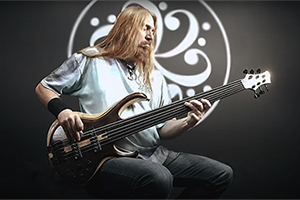
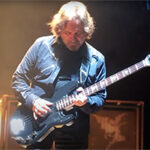
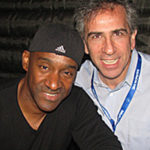
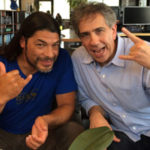
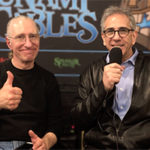

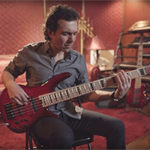
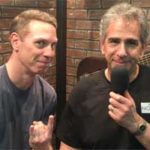
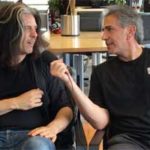

Regarding the advantage of age, I think an older player possibly
has had more listening experience and understands experientially
the importance of the process.